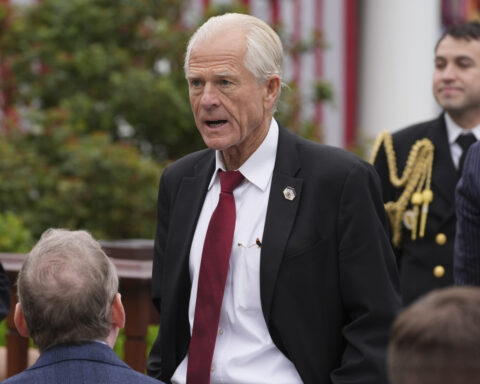By Lindsay Dunsmuir and Ann Saphir
(Reuters) - U.S. central bank policymakers pushed back on Monday against the notion that weaker-than-expected July jobs data means the economy is in recessionary freefall, but also warned that the Federal Reserve will need to cut rates to avoid such an outcome.
Many of the latest job report's details leave "a little more room for confidence that we're slowing but not falling off a cliff," San Francisco Fed President Mary Daly said at an event in Hawaii.
"Our minds are quite open to adjusting the policy rate in coming meetings," she said. When and by how much will depend on incoming economic data, of which there is a lot before the Fed's next meeting in mid-September, she said, adding, "it's extremely important that we not let (the job market) slow so much that it tips itself into a downturn."
U.S. stocks fell steeply on Monday amid fears the U.S. central bank has waited too long to begin cutting interest rates. Interest-rate futures contracts at the day's end reflected overwhelming bets that the Fed will start cutting borrowing costs next month with a bigger-than-usual 50-basis-point reduction to its policy rate.
Speaking earlier on Monday, Chicago Federal Reserve President Austan Goolsbee cautioned against taking too much of a signal from the global market sell-off, noting it stemmed in part from the Bank of Japan's decision last week to raise rates, as well as increasing geopolitical tensions in the Middle East.
"The law doesn't say anything about the stock market; it's about the employment and it's about price stability," Goolsbee said in an interview with CNBC, referring to the Fed's dual goals set by Congress, as he noted how prone financial markets were to volatility.
Nonetheless, Fed policymakers need to be aware of the possibility that markets are signaling a change in the economy's direction, he said.
"If the market moves give us an indication over a long arc that we're looking at a deceleration of growth, then we should react to that," Goolsbee said. "As you see jobs numbers come in weaker than expected but not looking yet like recession, I do think you want to be forward-looking at where the economy is headed for (in) making the decisions."
Fresh data on Monday showed that the vast U.S. services sector rebounded from a four-year low last month, with a measure of services employment rising for the first time since January.
The U.S. services data "aligns with our view of an economy in transition rather than one on the brink of collapse," said Matthew Martin, a U.S. economist at Oxford Economics. "Expectations for aggressive rate cuts in September are overdone."
INTER-MEETING CUT
The Fed kept its benchmark interest rate unchanged in the current 5.25%-5.50% range last week and signaled it was on course to begin cutting rates in September, but that decision was followed by worrying signs the labor market might already have turned.
The number of Americans filing new applications for unemployment benefits increased to an 11-month high while job gains markedly slowed in July and the unemployment rate rose to 4.3%.
The data cast doubt on Fed Chair Jerome Powell's assertion directly after the latest policy meeting that the labor market appeared to be normalizing gradually, which would allow the central bank to take a bit more time before cutting rates to ensure inflation was fully quelled.
Instead, economists and traders honed in on Powell's other comments that the Fed would respond if there was an unexpected deterioration in the labor market.
Asked about the possibility of an inter-meeting rate cut, Goolsbee said "everything is always on the table" from rate increases to cuts as the Fed maintains its focus on employment, inflation and financial stability.
"If the conditions collectively start coming in on the through line that there's deterioration on any of those parts, we're going to fix it," Goolsbee said.
Inter-meeting cuts are typically reserved for emergencies, however, and so far neither Goolsbee nor Daly signaled that's what they are seeing.
Last week marked a shift in the Fed's communications to focus on its full employment mandate as much as its price stability mandate, Daly said, and that shift has sparked a downward move in market-determined borrowing costs like mortgage rates.
"The communication itself is a policy adjustment," she said.
(Reporting by Lindsay Dunsmuir and Dan Burns; Editing by Toby Chopra, Andrea Ricci, Jonathan Oatis and Paul Simao)

 Trump has begun another trade war. Here's a timeline of how we got here
Trump has begun another trade war. Here's a timeline of how we got here
 Canada's leader laments lost friendship with US in town that sheltered stranded Americans after 9/11
Canada's leader laments lost friendship with US in town that sheltered stranded Americans after 9/11
 Chinese EV giant BYD's fourth-quarter profit leaps 73%
Chinese EV giant BYD's fourth-quarter profit leaps 73%
 You're an American in another land? Prepare to talk about the why and how of Trump 2.0
You're an American in another land? Prepare to talk about the why and how of Trump 2.0
 Chalk talk: Star power, top teams and No. 5 seeds headline the women's March Madness Sweet 16
Chalk talk: Star power, top teams and No. 5 seeds headline the women's March Madness Sweet 16
 Purdue returns to Sweet 16 with 76-62 win over McNeese in March Madness
Purdue returns to Sweet 16 with 76-62 win over McNeese in March Madness








